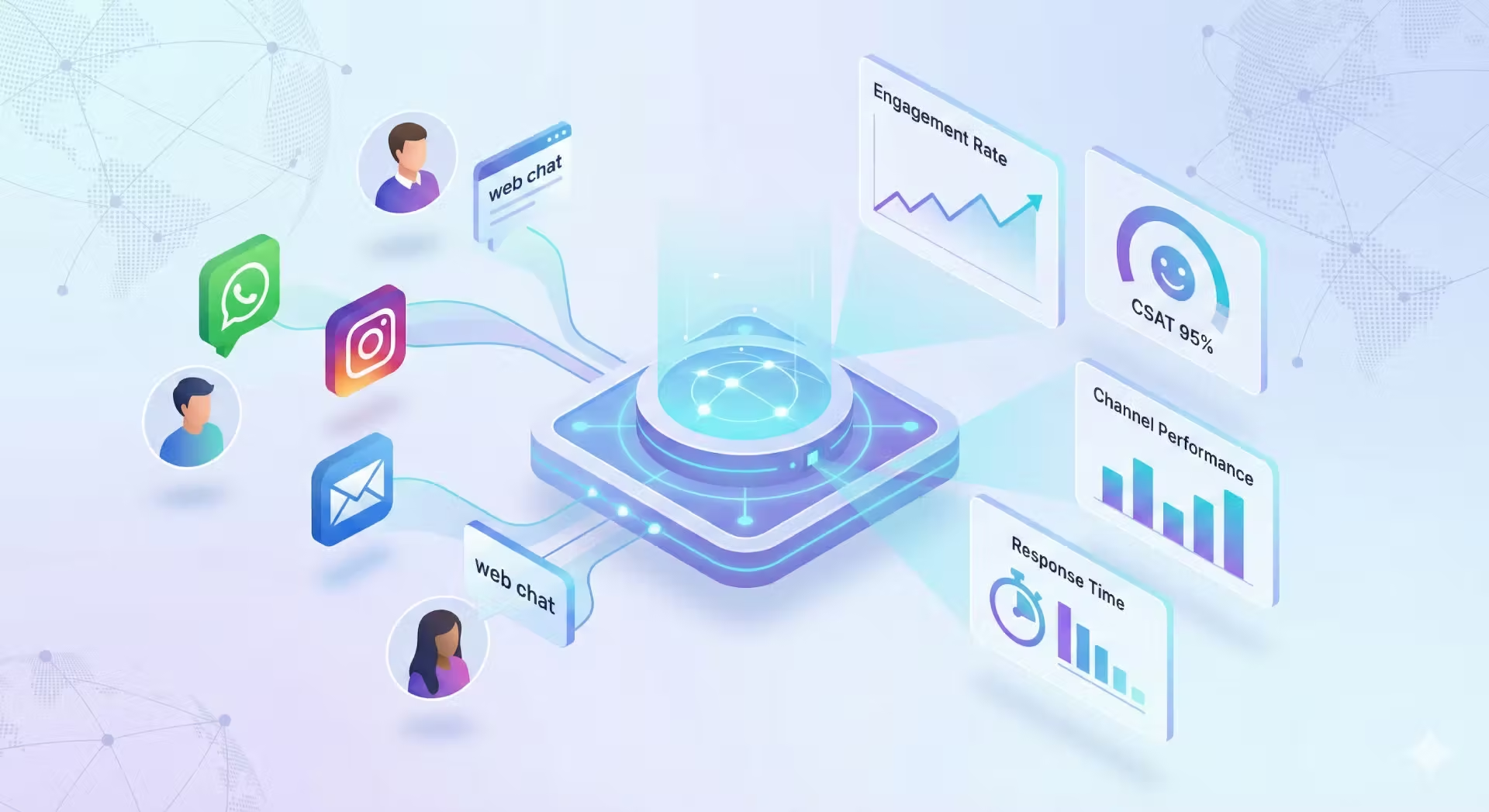Best AI customer service tools to transform your support in 2026
Choosing the right customer service platform can be the difference between loyal, happy customers and a horrible reputation. However, with numerous options promising faster responses, smarter automation, and enhanced customer experiences, it’s challenging to determine which one is the ideal fit for your business and its specific needs.
That’s why we’ve rounded up and reviewed 11 of the best customer service AI tools, breaking down their features, pros, cons, and pricing, so you can find the perfect fit for your business without endless hours of research.
What are AI tools for customer service?
AI tools for customer service are platforms that help businesses automate and improve how they communicate with customers. They use technologies like machine learning, natural language processing (NLP), and predictive analytics to increase speed, accuracy, and personalisation in responding to customers.
You can think of AI tools like a customer service assistant that never sleeps or gets burned out by handling repetitive questions. On top of that, they can use historic data to predict customer needs, and ensure every conversation flows smoothly across multiple channels such as live chat, email, social media, and messaging apps.
Instead of simply following scripts, modern AI tools understand context, learn from past interactions, and can adapt to more complex queries over time. This means you can offer 24/7 support, reduce response times, and create seamless omnichannel experiences without overwhelming your human teams. Whether it’s answering FAQs, routing conversations to the right agents, or analysing customer sentiment, AI tools are quickly becoming an essential part of efficient, scalable customer service.
Top 11 AI tools for customer service 2026 reviewed
1. Trengo
Trengo is an omnichannel customer service platform designed to help teams manage conversations across multiple channels, such as:
- Live chat
- Facebook Messenger
All of these channels and more can be managed from one central inbox. This connected interface is designed for busy customer service teams and can be used to establish a structured approach to customer communication, thereby reducing the time spent switching between channels.
With AI Journeys, teams can set up proactive support flows that guide customers to the solutions they need, eliminating the need for your teams to intervene. Flowbots automate FAQs and repetitive tasks to save your team time. And the new AI Helpmate lets you create a custom chatbot using your own documents with no coding knowledge required.
Trengo also offers a range of handy integrations that make it easy to integrate with your existing tech stack. These include tools such as:
- Shopify
- WooCommerce
- HubSpot
- Salesforce
For teams seeking to streamline support, automate workflows, and maintain control over every conversation, Trengo provides a reliable and scalable solution.
Features:
- Central inbox for email, WhatsApp, Instagram, Facebook, and chat
- AI Journeys for automated customer flows
- Flowbots to automate common questions
- AI Helpmate to build chatbots from PDFs
- E-commerce and CRM integrations
- Customer satisfaction and agent analytics
- GDPR compliance
Pros
- Easy-to-use interface
- WhatsApp and social messaging to connect with customers where they are
- Powerful automation features that save a lot of time
- Helpful support and well-established Knowledge Base
Cons
- Flowbots are an additional paid feature
- Limited options for advanced chatbot customisation
Pricing
- Boost: €299/month for 10 users and 6,000 conversations per year
- Pro: €499/month for 20 users and 18,000 conversations per year
- Enterprise: Custom pricing, with brand white-label and tailored integrations
2. Zendesk
Zendesk is a well-known platform for customer support automation, built mainly to serve enterprises with more complex workflows. Its AI tools focus on speeding up response times, automating ticket assignment, and helping customer service teams manage conversations faster while retaining quality.
Zendesk’s AI-powered chatbots can handle common queries and direct customers to help articles or respond to FAQs. They can struggle with more complex, nuanced or multi-step requests, and in these cases, things get passed over to a member of your team who is qualified to answer the customer's question.
Tools like Suggested Replies, Ticket Summaries, and Intelligent Triage help teams respond faster to customer inquiries by categorising tickets by urgency and topic. However, to get the most out of the tool and create the most effective setup there is a significant amount of upfront work required.
Zendesk works best for large, complex teams that have the resources to invest in AI setup and maintenance. Smaller teams may find it more resource-intensive and not be able to reap the full benefits.
Features
- AI bots for automated FAQs and routing
- Suggested replies and agent ticket summaries
- Intelligent triage for ticket categorisation
- AI transcription and call summaries
- Knowledge suggestions for agents
- Integration with CRM systems and workflows
Pros
- A lot of automation options for large-scale operations
- Powerful workflow and ticket management tools
- In depth analytics and reporting dashboards
- Built-in agent support tools
Cons
- Higher cost with add-ons needed for full AI capabilities
- Complex setup and long implementation time (4–8 weeks)
- Limited flexibility in knowledge base integration
- Customer support for Zendesk users can be slow
Pricing
- Suite Team: €55 per agent/month (annual billing)
- Suite Growth: €89 per agent/month (annual billing)
- Suite Professional: €115 per agent/month (annual billing)
- Suite Enterprise: Custom pricing (Contact Sales)
- Advanced AI features and add-ons are available at additional cost
3. Freshdesk
Freshdesk is a popular customer support platform from Freshworks, known for its multichannel support, user-friendly ticketing system, and flexibility. It helps businesses of all sizes manage customer conversations across email, chat, and social media from a central workspace.
Freshdesk’s AI tools for customer service, including chatbots and automated ticket routing, are designed to improve response times and handle repetitive tasks. Teams can customise their workflows, automate assignments, and offer customers self-service options through the company's knowledge bases and forums. The platform also has built-in analytics, although some users find its reporting more basic compared to competitors.
While Freshdesk is a great out-of-the-box product, the number of features can be a bit overwhelming for new users, and some integrations require additional costs. Still, for growing businesses that need flexibility, multichannel support, and easy automation, Freshdesk remains a reliable and scalable choice.
Features
- Unified inbox for email, SMS, chat, and social media
- AI-powered chatbots for instant support
- Automated ticketing and assignment
- Reporting and performance analytics
- CRM and third-party app integrations
- Mobile app support
Pros
- Good multichannel support across platforms
- Customisable workflows and ticketing
- Easy-to-use interface with straightforward onboarding
- Affordable pricing compared to enterprise-level tools
Cons
- Advanced features can feel overwhelming for new users
- Reporting and analytics are less detailed than some competitors
- Certain integrations and add-ons may add extra cost
Pricing
- Growth: €29 per agent/month (billed annually)
- Pro: €69 per agent/month (billed annually)
- Enterprise: €109 per agent/month (billed annually)
4. Intercom
Intercom is a well-known name in customer support, offering a tool with a huge range of features, including live chat, helpdesk ticketing, outbound messaging, and AI automation. It is mainly used by larger teams and enterprises that are searching for an all-in-one solution for customer communication and support.
Intercom’s AI capabilities come from Fin, their AI agent. Fin uses generative AI to handle common customer queries with a natural and human-like conversational flow. It also gives seamless human handoffs when needed for more complex inquiries. Intercom also offers tools for outbound messaging, knowledge base management, product tours, and more proactive customer engagement.
Intercom is best suited for enterprise or large, scaling businesses that need advanced automation, extensive customisation, and multichannel support, and have the resources to manage the ongoing costs and complexity of the initial setup.
Features
- Live chat, email, SMS, and social messaging in one platform
- Fin AI agent for natural-sounding AI-powered conversations
- Help desk ticketing and CRM features
- Workflow automation and proactive messaging
- Product tours and in-app messaging
- Advanced analytics and reporting dashboards
Pros
- Fin agent gives natural, human-sounding responses
- Comprehensive tools for managing customer engagement in one place
- Flexible automation and messaging options
- Powerful for large teams with complex workflows
Cons
- Pricing is complex and can become expensive
- Additional charges for messaging, AI usage, and proactive support
- Steep learning curve for setup and management
- Not be ideal for small businesses with limited budgets
Pricing
- Essential: $29 per seat/month (billed annually)
- Advanced: $85 per seat/month (billed annually)
- Expert: $132 per seat/month (billed annually)
- Fin AI agent: $0.99 per resolved conversation (billed separately)
Additional costs apply for proactive support, outbound messaging, and AI usage expansions
5. Salesforce Service Cloud
Salesforce Service Cloud is a powerful AI tool for customer service built for large businesses and enterprises that need to be able to deliver customer support across multiple channels at scale. It offers case management, real-time messaging, AI-powered recommendations, and self-service portals, all integrated into Salesforce’s broader CRM ecosystem.
Its standout feature is Einstein AI, which helps automate workflows, predict customer needs, and recommends actions for customer support to take next. Service Cloud also includes in-depth analytics and reporting to help teams track performance and customer satisfaction in detail.
While highly customisable, Salesforce Service Cloud can be complex to set up and manage without technical support. It’s best suited for mid-sized businesses to large enterprises with dedicated resources for CRM management.
Features
- Case management and live agent support
- Einstein AI for automation and predictions
- Omnichannel routing across chat, voice, and social
- Self-service portals and knowledge bases
- CRM integration
Pros
- Highly customisable with strong AI capabilities
- Seamless CRM and sales integrations
- Advanced analytics and reporting
Cons
- High cost, especially for AI features
- Requires technical expertise to get the most out of all the features
- Steep learning curve for new users
Pricing
- Starter Suite: €25 per user/month
- Pro Suite: €100 per user/month
- Enterprise Suite: €165 per user/month (billed annually)
6. Ada
Ada is an AI-first customer service platform designed to help businesses automate conversations at scale without writing code. Its main strength is the ability to build chatbots through a drag-and-drop interface, supported by natural language processing (NLP) and generative AI.
Ada supports over 50 languages, integrates with popular platforms like Zendesk and Facebook, and has visitor tracking and analytics. However, the platform’s reporting features are fairly basic, and it lacks a native mobile app. Pricing is not transparent and requires a custom quote, which can be a hurdle for smaller businesses.
Ada is best suited for customer service teams looking for a powerful chatbot that connects with existing knowledge bases. It helps automate common inquiries while routing complex cases to live agents when needed.
Features
- AI-powered chatbot builder with NLP
- Generative AI for knowledge retrieval
- 50+ language support
- Visitor tracking and analytics
- Integrations with CRM and support platforms
Pros
- No coding required to build bots
- Multi-language support
- Smooth integrations with major platforms
Cons
- Pricing is not transparent
- Limited reporting customisation
- No dedicated mobile apps
Pricing
- Custom quote required (no public pricing available)
7. Sprinklr
Sprinklr is a customer service AI tool that offers customer service, social media management, and marketing all in one. Its Service product focuses on helping large businesses streamline support across channels like email, social media, chat, and voice.
Sprinklr uses AI to automatically route tickets, suggest agent responses, and provide real-time customer sentiment analysis. It’s especially good at managing high volumes of inquiries across multiple social platforms. However, the platform can be complex to set up and navigate, and its pricing is geared more toward enterprise-level businesses.
Sprinklr suits large businesses looking to unify customer communications while using AI to increase team efficiency and response quality.
Features
- Omnichannel support across social, email, and chat
- AI-driven ticket routing and response suggestions
- Sentiment analysis and real-time reporting
- Built-in CRM and case management tools
Pros
- Strong AI automation and insights
- Excellent social media integration
- Highly scalable for enterprises
Cons
- Complex setup and learning curve
- Higher pricing compared to smaller solutions
Pricing
- Custom quote required (no public pricing available)
8. HubSpot Service Hub
HubSpot Service Hub is an all-in-one platform designed to help businesses streamline customer support, boost self-service, and improve customer satisfaction. It brings together essential tools like ticket management, a robust knowledge base, live chat, conversational bots, customer feedback surveys, and SLA tracking—all tightly integrated with HubSpot CRM.
The platform stands out for its ease of use, strong automation capabilities, and powerful reporting dashboards. It’s a great choice for teams looking to centralise support workflows and deliver faster, more personalised customer service. However, some users mention that advanced features can add to the cost, and the platform’s reporting and customisation options could be deeper for very complex needs.
HubSpot Service Hub is best suited for growing businesses wanting a scalable, user-friendly solution to professionalise their support operations.
Features
- Ticketing and live chat
- Knowledge base and self-service tools
- Customer feedback and reporting
- CRM integration and automation
Pros
- Easy-to-use ticketing system
- Good knowledge base and self-service options
- Live chat and conversational bots for real-time support
- Automation to streamline repetitive tasks
- Comprehensive reporting and dashboard
Cons
- Customisation options can be limited for complex workflows
- Reporting could offer deeper flexibility and granularity
- Integration with certain third-party tools can be challenging
- Steep learning curve for building complex workflows
Pricing
- Starts from €90/user/month
9. Tidio
Tidio is one of those AI tools for customer service that covers all bases. It has live chat, chatbots, and ticketing to help small and mid-sized businesses deliver fast, high-quality support.
Tidio comes with a simple to use interface, quick setup, and tools that improve both customer service and sales workflows. It supports multichannel communication so that businesses can manage conversations from their website, email, Instagram, and Facebook in one unified inbox.
Tidio’s chatbot builder makes it easy to automate customer interactions without coding, while its Lyro AI chatbot can handle simpler inquiries automatically. The platform also provides analytics to track team performance and customer satisfaction.
Tidio offers a free plan, scalable pricing, and a range of integrations with CRM and e-commerce platforms. It's a solid choice for growing businesses looking to automate more of their support without a steep learning curve.
Features
- Live chat with visitor tracking and CRM integrations
- Drag-and-drop chatbot builder with 35+ templates
- Lyro AI chatbot automating customer queries
- Omnichannel support across web chat, Instagram, Facebook Messenger, WhatsApp
Pros
- Quick setup and highly intuitive interface
- Strong free plan with core functionality
- Easy integrations with ecommerce and CRM tools
Cons
- Basic analytics compared to larger platforms
- Trigger-based pricing for chatbots can add costs
- Desktop app performance can lag behind browser version
- Advanced AI features locked behind premium plans
- Branding removal and customisation come at extra cost
Pricing
- Free plan: €0/month – Includes 50 live chat conversations and 100 chatbot interactions
- Starter: €24.17/month – 100 conversations, basic automations
- Growth: €49.17/month – Up to 2000 conversations
- Plus: Starting at €749/month – Up to 5000 Lyro AI conversations, Multilanguage and OpenAPI
- Lyro AI chatbot: Starting at €32.50/month – 50 conversations
10. LivePerson
LivePerson is a customer service AI platform built specifically for enterprises aiming to modernise their customer engagement. LivePerson allows for messaging that is powered by AI across web, mobile apps, SMS, and social channels like WhatsApp, Facebook Messenger, and Instagram.
It allows businesses to automate responses to some of their most common conversations, improve customer service efficiency, and deliver personalised responses at scale. Features like natural language processing (NLP), generative AI, and omnichannel engagement make it possible for established businesses with ingrained systems to move beyond traditional support and start embracing digital.
LivePerson’s analytics suite offers real-time insights into customer intents, satisfaction, and agent performance. While setup can be complex and pricing is custom, the platform is highly regarded for its scalability, AI innovation, and integrations with CRM and marketing systems.
Features
- AI-driven messaging across web, mobile, social, and voice channels
- Natural Language Processing (NLP) and intent recognition
- Customisable chat widgets and proactive messaging
- Advanced analytics and reporting dashboards
- Integrations with Salesforce, Google Business Messages, WhatsApp, and more
- API support for extensive customisation
Pros
- Powerful AI and NLP for highly accurate and human-like conversations
- Strong omnichannel and automation capabilities
- Enterprise security and compliance
Cons
- Steep learning curve for setup and configuration
- No transparent public pricing
- Can be overwhelming for smaller teams
- High dependence on technical resources for customisation
Pricing
- Conversational Cloud: Custom quote
- Conversational Cloud + Generative AI: Custom quote
- No free trial: Custom demos available on request
11. HappyFox
HappyFox is a powerful, AI helpdesk software built to streamline customer support workflows. Designed for medium sized businesses up to enterprise level operation, it creates a central space for all customer interactions such as email, live chat, phone, and web forms into a single, manageable ticketing system.
It was built to be easy to use and puts a strong focus on automation features, and multi-channel support. As such, it helps teams become more efficient and deliver faster resolutions. It has a highly customisable interface which combined with its strong security make it a viable option for enterprises needing flexibility and compliance. However, higher costs and a minimum agent requirement mean that it's not always the best choice for small teams.
HappyFox is a great choice for businesses needing reliable ticket management and multilingual support.
Features
- Unified ticketing system across email, chat, phone, and social media
- Multilingual support with 35+ languages
- Secure cloud infrastructure with AWS and strong encryption protocols
- 2FA, IP whitelisting, and detailed audit trails for extra security
- Seamless integrations with Salesforce, Microsoft Teams, and more
Pros
- Easy to set up and intuitive for teams
- Excellent automation capabilities reduce manual work
- Multi-channel support in one place
- Extensive online resources and free webinars for training
Cons
- Pricing can be high for smaller teams
- Minimum of 5 agents required across all plans
- Extra charges for native live chat add-ons
Pricing
- Basic: $199 /month
- Team: $499 /month
- Pro: $999 /month
- Enterprise: $1999 /month
Why so many businesses are turning to AI customer service solutions
AI tools for customer service are transforming the way teams connect with customers. Here’s how they are changing customer service.
Instant responses, any time of day
AI chatbots and virtual agents are always available., You can give your customers immediate responses and support even when your human team is offline. Customers are no longer kept waiting which improves their overall customer service experience.
More personal, less robotic
Today’s AI tools use machine learning and natural language processing to understand customer needs and offer personalised, human-like answers. They are no longer frustrating bots that go round in loops and leave your customers bangiing their heads against their keyboards
Free up your human team members time
By handling routine inquiries and simple tasks, AI lets your support team focus on what they are best at: solving complex issues and building real customer relationships.
Smarter strategic decision making
AI constantly analyses conversations to spot trends, predict customer needs, and give you insights that can influence your overall customer service strategy.
Scale support without scaling costs
As your business grows, AI customer service tools can grow with you. You can handle more conversations, across more channels, without needing to triple your team size.
Essential types of AI tools for customer service
The right AI tool can transform your customer service from reactive to proactive. Here are four essential tools that every business should know about.
AI chatbots
Your first line of support. AI chatbots handle FAQs, guide customers through processes, and manage conversations 24/7 — without adding pressure to your team.
Best for: Businesses with high volumes of repetitive inquiries needing quick, consistent answers.
Virtual assistants
Virtual assistants can access customer data, understand complex queries, and deliver personalised, human-like support.
Best for: Service-focused industries like healthcare, banking, and travel.
Predictive analytics
Predict problems before they happen. AI scans past interactions to forecast customer needs, letting your team take proactive steps to boost satisfaction.
Best for: Subscription services, tech companies, and fast-paced industries.
Automated ticketing
Sorts and prioritises tickets automatically, sending every query to the right agent or department, instantly and accurately.
Best for: Teams handling high ticket volumes that need to maintain tight response times.
How to choose the best AI customer service platform
Not every AI tool will meet your team's needs or align with your goals. Here's what to think about when selecting the right AI tool.
Accuracy and performance
- Check first-contact resolution rates and AI learning improvements.
- Compare average response times with industry benchmarks.
- Ask for real-world examples showing performance improvement.
Compliance and data security
- Confirm GDPR, CCPA, and other regulatory compliance.
- Ensure data encryption standards are strong for data at rest and in transit.
- Ask about breach history and security audit processes.
Ease of integration
- Look for open APIs that match your current tech stack.
- Check how customisable the system is for your workflows.
- Review onboarding and technical support services.
Scalability and cost
- Make sure the tool handles peak volumes without a dip in performance.
- Request a full cost breakdown, including upgrade or scaling fees.
- Look at ROI case studies to understand long-term value.
Customisation and brand fit
- Confirm the AI can mirror your brand tone and customer experience style.
- Explore options for visual branding and workflow tailoring.
Vendor reliability
- Review client success stories, especially from your industry.
- Choose vendors with a strong innovation track record and financial stability.
AI customer service tools that can make you future-proof
AI customer service tools are no longer a nice-to-have; they're an essential tool for any business that wants to stay fast, flexible, and customer-focused. From AI chatbots to predictive analytics, the right solution can completely transform how you engage with your customers, scale your support, and stay ahead of the competition.




.png)











